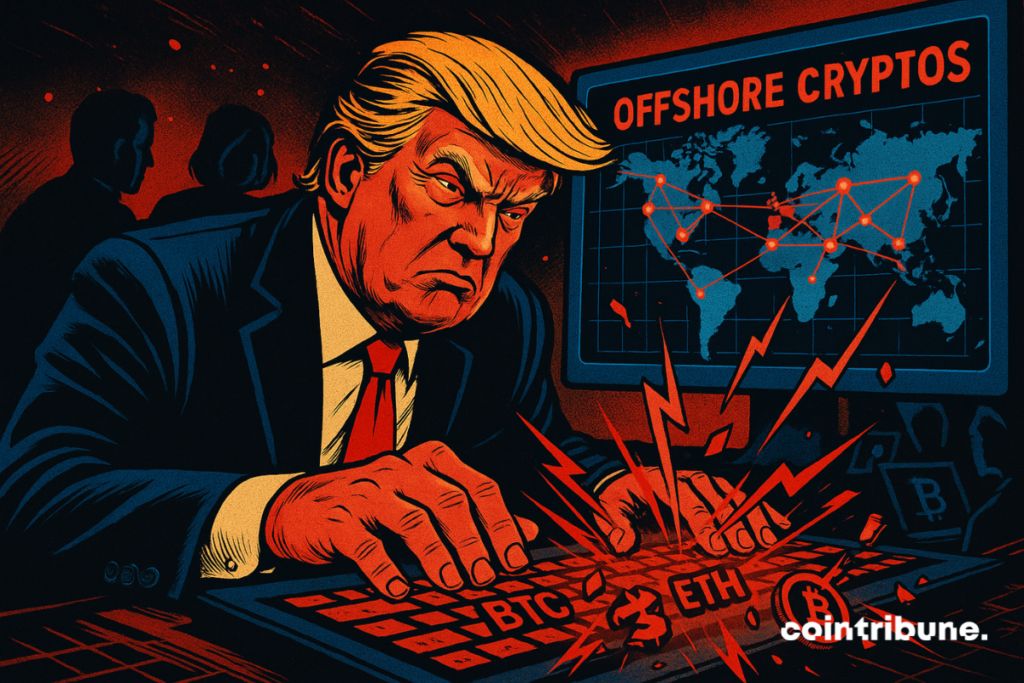Crypto: Trump Prepares a Global Tax Hunt
Has Trump changed course? Or is he juggling a double crypto discourse? The man who promised financial freedom through digital assets now seems to be on a regulatory cruise. Behind flattering pro-crypto statements, he is weaving a global tax net around American citizens. Regulation or seduction: is the president playing both roles at once? Behind the scenes, the CARF project seems to suit him well. What if the offshore crypto hunt was the new Trumpist banner?

In brief
- Trump prepares the US entry into the global CARF tax network for offshore cryptos.
- The plan targets undeclared digital accounts held abroad by American taxpayers.
- More than 40 countries have already adopted this automatic tax information sharing mechanism.
- DeFi currently escapes these rules, with no reporting obligations yet.
USA, CARF and Crypto Havens: The End of Gentle Tax Evasion?
Since November, the CARF plan has been on the presidential desk. An international tax agreement backed by the OECD and already adopted by more than 40 countries. Objective? Automatically exchange data related to crypto accounts held abroad. A crypto version of FATCA, where the Bahamas, Dubai, or Singapore are no longer quiet havens.
Trump paved the way as early as July via a 168-page report, stating that lack of oversight would harm national competitiveness. In plain terms, the United States no longer wants to see digital capital sail offshore. In the words of his administration :
Implementing CARF would discourage American taxpayers from transferring their digital assets to offshore platforms. Implementing CARF would promote growth and use of digital assets in the United States, and alleviate concerns that the absence of a reporting program could disadvantage the United States or American digital asset platforms.
This project also targets individuals who transfer their assets to foreign exchanges. A bill is on the Congress table, aiming to require citizens to report any digital account opened abroad. Forgetting to report would come with penalties. The message is clear: no more riding as a stowaway on crypto taxation.
The Geopolitical Backstage of Trump-Made Crypto Surveillance
This shift fits into a global dynamic to curb opaque flows. According to the DOJ, crypto scam networks cost $9.3 billion in 2024 alone. And in some remote parts of the world, the figures shake economic compasses.
Some of these fraudulent centers are so lucrative that they might represent up to half of the local GDP, according to authorities. After draining cryptos from their victims, the funds are then concealed through a web of offshore wallets.
This punitive logic does not only affect individuals. Uncooperative exchanges are in the crosshairs. And while the USA tightens control, other crypto powers follow suit. Japan, France, and Germany already share data via CARF. In focus: cross-border crypto capital flows.
By donning the regulator’s hat, Trump seems to seek to clean up without breaking the china. Proof: CARF rules, though strict, currently spare DeFi transactions. A gray zone remains tolerated, as if not to scare decentralization purists.
Crypto, Taxation, and Innovation: The Balancing Act of a Tense Ecosystem
As regulators tighten the screws, the debate heats up in the crypto industry. Some see it as an opportunity for legitimization. Others denounce excessive control. Between the two, voices seek balance.
A mediator role emerges between regulators and developers, with increasing calls to design hybrid frameworks balancing privacy and tax obligations. This nuanced approach could well become an inspiration source for the entire crypto industry.
Key Takeaways
- More than 40 countries, including the USA, plan global CARF implementation from 2027;
- In 2024, crypto scams caused $9.3 billion in losses according to the Department of Justice;
- Foreign exchanges will have to transmit Americans’ tax data to the IRS;
- DeFi remains currently outside CARF requirements (by presidential decision).
As if that were not enough, Washington’s SEC just drove the point home: crypto isn’t even on its strategic priorities for 2026 . The timing of this omission feels like a second warning. America seems determined to redefine the crypto rulebook.